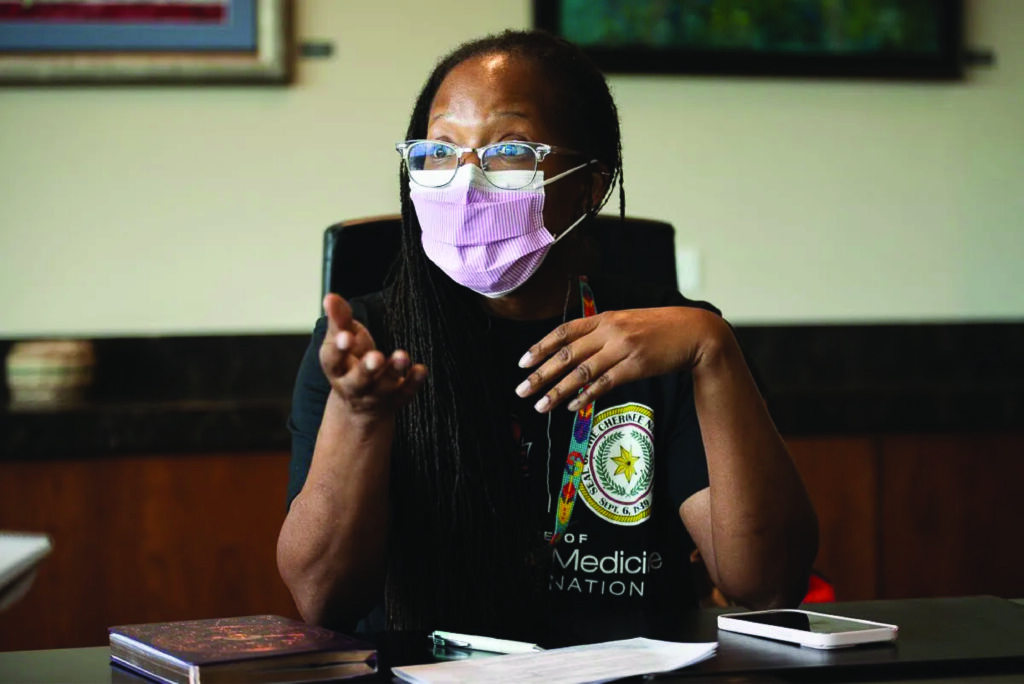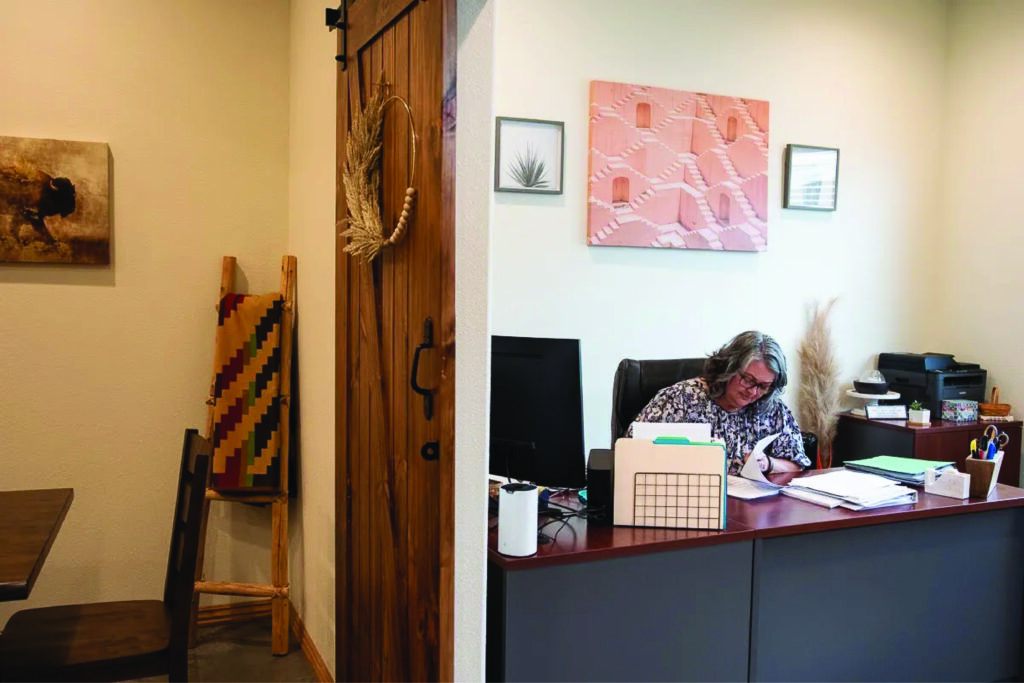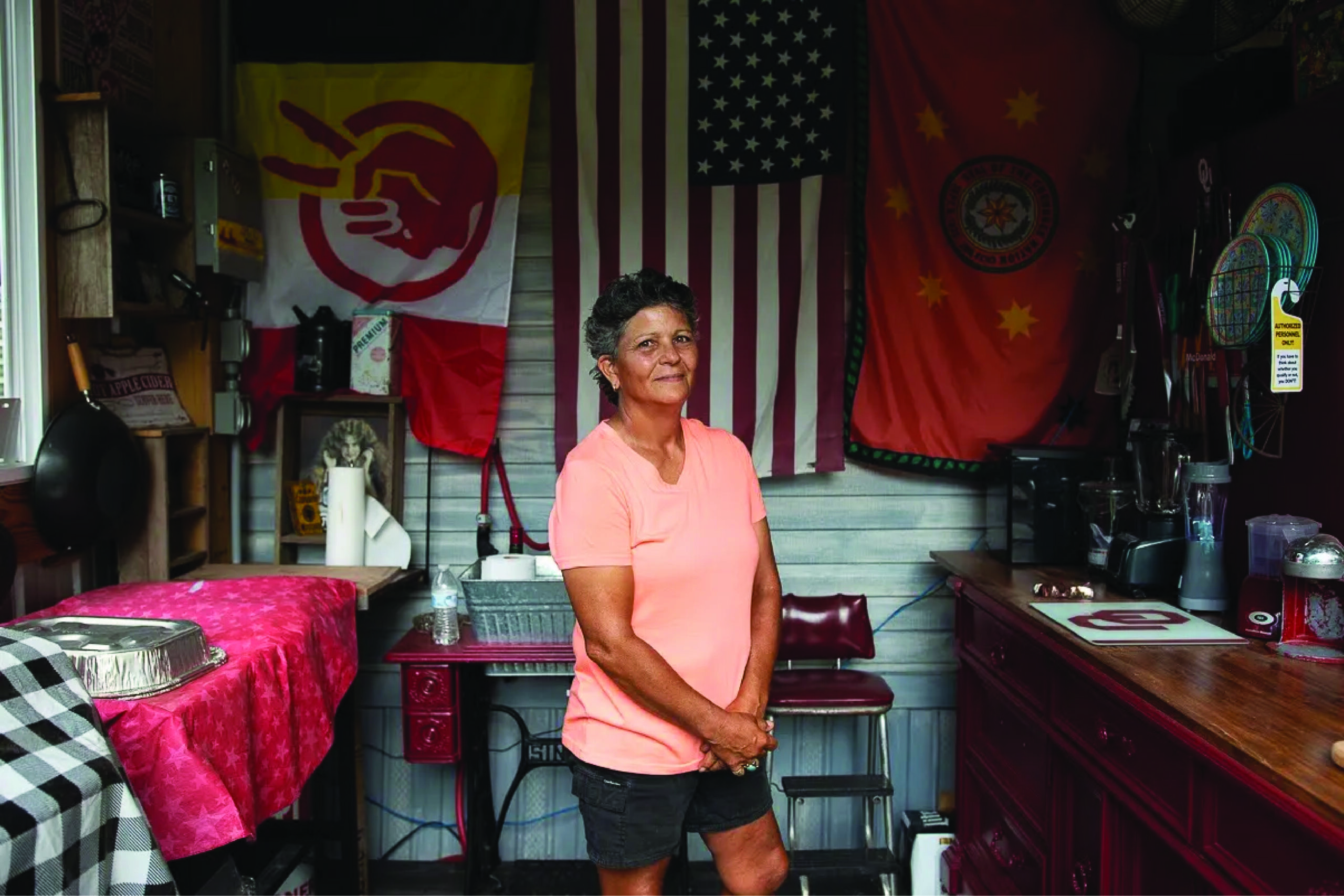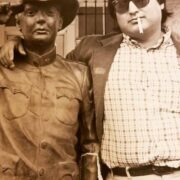Whitney Bryen
Oklahoma Watch
ILLUSTRATION
Whistleblower Patti Mitchell became skeptical about the National Indian Women’s Health Resource Center soon after taking a job with the Tahlequah nonprofit. Since she was let go, Mitchell has spent months trying to convince federal agencies and authorities to look into the center. (Whitney Bryen/Oklahoma Watch)
(This story was reported in collaboration with KGOU reporter Hannah France and supported by a grant from the Oklahoma Media Center funded by the Native American Journalists Association.)
TAHLEQUAH — On her first day of work, Patti Mitchell walked into the National Indian Women’s Health Resource Center filled with pride. The walls were covered with black and white photographs of Native American women. As a Cherokee, Mitchell was thrilled to serve her people.
From the middle of Indian Country, the nonprofit mentored girls in tribal communities nationwide. It advised federal agencies on policies that would benefit Indigenous women. It advocated for women to be included in research that could help reduce and treat cancers and other conditions that disproportionately impact Native women.
It didn’t take long for Mitchell to realize how far the center strayed from its mission, which was shaped by a White House directive 30 years earlier.
Instead, the National Indian Women’s Health Resource Center was educating teens at the Tahlequah skatepark about the dangers of underage drinking. Pamphlets around the office advertise sex education for middle schoolers. A brochure titled “Your Life is Worth Living” lists signs that someone might be suicidal and the national suicide hotline.

None directly addressed Indigenous women, Mitchell said. And according to her new coworkers, the nonprofit wasn’t living up to its new mission to care for Cherokee County youth.
Emails confirm that the nonprofit was not fulfilling federal requirements, jeopardizing millions in public funds that support those programs.
New focus and leadership drove many of the National Indian Women’s Health Resource Center’s board members away in 2015, leaving its director, Janie Dibble, and the more than $4.3 million in federal funds she managed unsupervised.
Lack of oversight resulted in years of mismanagement and allegations of fraud and embezzlement, leaving Native American women without the aid the nonprofit was designed to provide, an Oklahoma Watch investigation found.
In March, about a month into her new job, Mitchell was closing the office for the weekend when an Indigenous woman wrapped in a Pendleton blanket tapped on the back door. Pam Iron, who founded the nonprofit and left in 2013, arrived to tell Mitchell and two other employees that Dibble emptied the organization’s bank account, taking more than $80,000.

Then Mitchell’s first paycheck bounced.
“I love my people and this absolutely broke my heart,” Mitchell said. “Bad Natives were making millions off my culture and off the money that could have been distributed so easily with a good nonprofit.”
No charges have been filed against Dibble.
Under Dibble’s tenure, federal agencies questioned employees about the progress of grants but failed to investigate incomplete or missing reports. The Internal Revenue Service either failed to notice or penalize the nonprofit for lying on annual tax forms by listing board members who hadn’t been active for years, in some cases more than a decade. There hadn’t been a board meeting in years, according to employees who searched the office for records.
Bert Thomas, a McAlester native who was hired by the nonprofit to ensure grant compliance, warned in emails to Dibble that the organization was not fulfilling requirements and would lose millions, and potentially face legal action, without immediate change.
When reached by phone, Thomas told Oklahoma Watch “no money was ever missing,” but would not elaborate and hung up. Thomas was paid more than $20,000 in grant funds for his work on a program intended to reduce and treat opioid use, according to a budget report.
Three employees independently verified that Dibble took the money, providing Oklahoma Watch with a whistleblower complaint they submitted to the U.S. Department of Health and Human Services investigative unit. Bank records show the balance before and after the money disappeared.
Before allegedly taking the money and closing the nonprofit’s bank account, Dibble wrote herself checks from the nonprofit’s account that employees describe as bonuses in addition to her nearly $80,000 salary.
Dibble did not respond to several requests for an interview.
With no board to answer to, Iron took over managing the grants and day-to-day operations. One of her first moves was putting Dibble on administrative leave with pay and benefits for one month.
In an email obtained by Oklahoma Watch, Iron told Dibble to take care of her health and concentrate on herself.
Former executive director Iron, who is the current director for two Tahlequah-based nonprofits assisting Native Americans, told employees in an email “I am a founding board member so I am using that authority to act in the best interest of the organization by taking the reins until we can establish the leadership of the organization.” Iron and her staff at the American Indian Resource Center were collaborating with the National Indian Women’s Health Resource Center on a program supported by federal grants when the money allegedly went missing.
In text messages, Iron told employees that “funding agencies do not need to know of any changes,” and, if asked, to say that Dibble is on leave.
Iron said the nonprofit currently has no plans to report or sue Dibble, who lives in Broken Arrow. Iron said the money was returned to the nonprofit and declined to elaborate on the circumstances.
In her nine years as director, Dibble managed more than 21 federal grants intended to reduce binge drinking and suicide among area youth, provide HIV testing for youth and young adults and prevent opioid use.
Employees said little work was done through those programs, none of which target Native American women’s health.
American Indian and Alaska Native women have the lowest life expectancy compared to other races and ethnicities, according to a recent Centers for Disease Control and Prevention report.

In Cherokee County, where the population is more than a third Native American, heart attacks, diabetes, hypertension and high-risk pregnancies are common among tribal women, said Dr. Tschantre Dorsett, director of women’s health at the Cherokee Nation Outpatient Health Center in Tahlequah.
Dorsett, who is a member of the Seminole and Muskogee (Creek) nations, said she had never heard of the National Indian Women’s Health Resource Center, which is located 2½ miles from the hospital.
‘Mission Creep’
The nonprofit was born from an advisory council developed during Bill Clinton’s presidency to improve women’s health.
Formed in 1993, The National Indian Women’s Health Steering Committee advised Indian Health Services, which had money to fund some of the recommendations but needed a nonprofit to do the work. Six years later, the National Indian Women’s Health Resource Center was formed.
Five members of the committee, including Iron, transitioned to the nonprofit. Iron, a member of the Cherokee and Laguna Pueblo tribes who grew up in Ponca City, became the first executive director and opened an office near her home in Tahlequah.
Under Iron’s leadership, the nonprofit trained those working with Indian health systems who were not Native American in cultural competency and helped women identify health challenges in their tribal communities and address them.
Over the next decade, White House directives shifted to HIV prevention and mental health until the nonprofit’s largest grant ended in 2010.
To bring in money, the nonprofit found new grants. One supported free HIV tests for hundreds of Northeastern State University students in Tahlequah. Another paid to train local school teachers to recognize signs of depression or suicidal thoughts. And another bought flyers and billboards listing the dangers of alcohol poisoning.
Fewer programs focused on Native American women and the organization’s national scope diminished. Now, it serves residents in northeastern Oklahoma.
“Unfortunately with nonprofits, many times, you go where the money is, and then you realize you’ve had mission creep,” said Iron, 77.
When Iron left the nonprofit in 2013, the board hired her second in command, Dibble, as the new executive director.
Vanishing Oversight
Dibble, 67, attended Tahlequah High School and Northeastern State. She was president of the board of directors for a nonprofit that receives Medicare and Medicaid funding to help tribal members stay in their homes as they age while running the National Indian Women’s Health Resource Center.
Founding board member Lydia Hubbard-Pourier said Dibble, who is Cherokee, and another Cherokee board member prioritized funding programs to benefit the Cherokee Nation — its capital in Tahlequah. That prevented others from assisting their communities, she said.
“A lot of us felt that the loss of a national focus was a major loss and that’s really when it started to fall apart I think,” said Hubbard-Pourier, who is Navajo and Tohono O’odham. “I was one of the first to drop out in 2015 and I know several others were not happy with the changes.”
Two years into Dibble’s leadership, the board, which once included representatives from at least 20 tribes, had dwindled from 14 members to five, according to the nonprofit’s annual tax forms.
The five-person board remained the same through at least 2018, which is the most recent available report. Two of those board members told Oklahoma Watch that they had not served on the board or worked with the organization in at least 10 years.
Chad Smith, former principal chief of the Cherokee Nation, said he had not served on the board since 2008 and was surprised to learn that he was still being listed as treasurer.
Rachel Crawford, who was unaware she was reported as secretary on recent tax forms, said she left the board in 2012 when Iron announced that she was leaving.
With no active board members, Dibble was left unsupervised.
By 2018, staff said Dibble’s health started to deteriorate. She sometimes struggled to walk from the nonprofit’s lobby to her office and she started forgetting things.
One day, an employee said Dibble asked for help moving her computer cursor. She had forgotten how to use a mouse.
Employees said they were required to get Dibble’s approval before spending money on the programs they were assigned. But their requests were often ignored or denied. COVID-19 further hampered employees who occasionally presented information about underage drinking, suicide and HIV in classrooms.

‘The Employees, Including You, Will Not Have a Job’
In 2021, the nonprofit was managing more than $2 million awarded through five grants, according to emails obtained by Oklahoma Watch. Three of those grants had no employees assigned to them. And two were already in jeopardy because the nonprofit failed to meet program requirements.
In a Dec. 27 email to Dibble, the nonprofit’s grant consultant warned that millions in public funds and the organization’s future were at risk.
“You are not in compliance and are not following the grant narratives or budgets,” Thomas said. “There will be no more money and you will have to close the office. The employees, including you, will not have a job.”
In a Jan. 9 email labeled “urgent,” Thomas warned Dibble that her inaction could lead to legal action by federal grantors.
Fearing for their jobs and that they could face consequences for their part in the mismanaged grants, employees began reaching out for help. They told Thomas and the nonprofit’s accountants about their concerns. They tried contacting board members on a decade-old list they found in the office.
One employee emailed federal grant coordinators at the Substance Abuse and Mental Health Services Administration about Dibble’s “mishandling” of public funds. In the email, she explained that she was listed on federal reports as the program director for a grant that she was not working on. A budget report for the grant listed her salary as $58,300. She said she never worked on the program. The federal employee she emailed said she needed to report to the agency’s law enforcement arm, which never responded.
She also called Iron for help last fall. She said Iron agreed to talk to Dibble, but nothing changed until after Dibble took the money in March.
The Monday after Iron shocked staff with the news of Dibble’s actions, the five remaining employees gathered at Mitchell’s house to strategize.
They sat in Mitchell’s living room sipping coffee, eating chicken salad and discussing what to do next.
Mitchell, 59, has spent her career working for nonprofits. She ran an exercise study for Indigenous kids at the University of Oklahoma Health Science Center, assisted people with disabilities and taught job skills and leadership classes. She started a business consulting for nonprofits and oversaw grant funding for the Cherokee Nation.
Dibble hired Mitchell in February and a month later, Mitchell still didn’t have an assignment. Her email wasn’t set up and her computer didn’t work. She sat at the conference table five days a week, from 9 a.m. to 4 p.m., reading grant reports, policy manuals and pamphlets she found around the office.
Mitchell’s experience didn’t improve after Iron took over. Mitchell fought Iron’s authority, which she said violates the organization’s policy requiring a board of directors to approve new management. Their contentious relationship continued until April 19, when Mitchell was fired. After she was let go, Mitchell sued the nonprofit over medical bills for a worker’s compensation claim related to issues caused by mold in the office.
Before Mitchell left, she and the other employees submitted whistleblower complaints to at least four federal agencies, including the FBI, and reported Dibble to the Cherokee County Sheriff, Oklahoma State Bureau of Investigation and the state Attorney General.
When asked if grantors were made aware that Dibble took the money, Iron said no, “you don’t ever do that.” She did inform them that a new director was hired in April.
Two months after employees submitted a whistleblower complaint, a federal investigator from Health and Human Services contacted Mitchell, who met with the investigator in Tahlequah.
Previous federal audits and investigations into mismanaged funds have resulted in the nonprofit paying restitution, having its grants suspended or terminated, and being banned from future grants.
Two employees at a Wisconsin nonprofit halfway house were sentenced to prison and financial restitution in October after embezzling more than $770,000, according to a Health and Human Services report.
An Oklahoma nonprofit and its former director face unknown penalties after federal auditors found more than $886,000 in mismanaged funds intended to support Oklahoma abuse victims.
Doing ‘What We’re Being Advised’
The National Indian Women’s Health Resource Center is under new management.
In April, Kimberley Chaffin, who is Cherokee and worked at the nonprofit under Iron and Dibble until 2019, returned as executive director.
Chaffin moved the nonprofit into a larger office in Tahlequah where the logo, which features four Native American women holding hands, hangs on the wall behind the front desk.
A board of directors is being installed by Iron and founding board member Julia Davis-Wheeler, who has been listed on tax forms as board chairperson since 2008. After initially agreeing to an interview, Davis-Wheeler stopped responding to requests.
Iron said the board will evaluate recent programs and determine whether those should continue or if the nonprofit should try to refocus on its original mission.
Changes to the website and the mission statement have already started. Even the nonprofit’s name is up for debate.
Chaffin said they are reviewing grants and bank accounts with an attorney and an accountant and being advised by the Oklahoma Center for Nonprofits about next steps.
“We’re just, we’re doing one step at a time and doing what we need to do, what we’re being advised,” Chaffin said.
Whitney Bryen is an investigative reporter at Oklahoma Watch covering vulnerable populations. Her recent investigations focus on mental health and substance abuse, domestic violence, nonprofits and nursing homes. Contact her at (405) 201-6057 or wbryen@oklahomawatch.org. Follow her on Twitter @SoonerReporter.
Hannah France is a reporter and producer for KGOU. Email her at hfrance@ou.edu. Follow her at @HannahMFrance.









